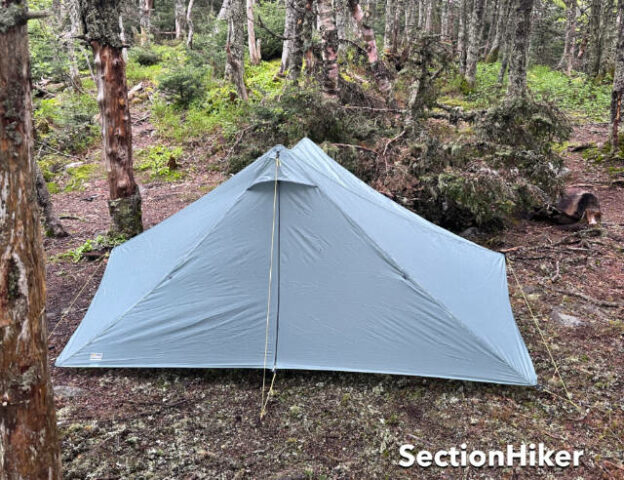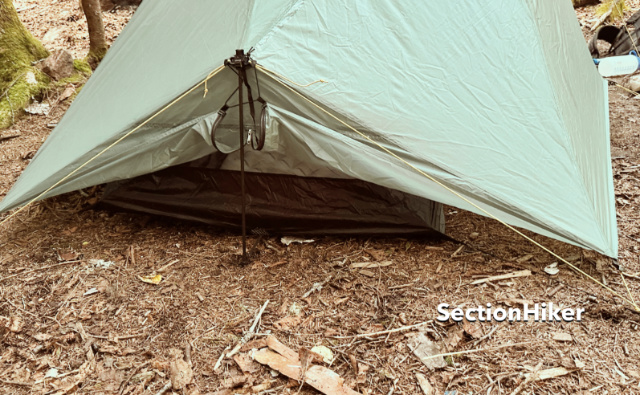The Tarptent Dipole 1 DW is an ultralight double-wall trekking-pole tent made with silicone-coated polyester that weighs 30.35 oz. It’s a spacious tent with two doors and two vestibules that can accommodate wide sleeping pads or tall hikers. The advantage of using a double-wall tent over a single-wall one is that internal condensation transfer is a non-issue since the mesh inner tent prevents you from coming in contact with moisture. In addition, you can pitch the Dipole 1 DW in pouring rain and the inner tent will remain dry. Tarptent also makes a single wall version made using Dyneema DCF called the Dipole 1 Li, which is similar in form but has several differences.
Specs at a Glance
- Type: Double Wall
- Weight: 30.35 oz
- Vestibules: 2
- Seam-sealing: Required (pay Tarptent to do this for you)
- Minimum Number of Stakes to Pitch: 4; Recommended: 6
- Trekking Poles: 2 (not included)
- Required Trekking Pole Length: 45-48 in / 114.3-122 cm
- Interior Height: 43 in / 109 cm
- Floor Width (tapered): 36″ (91 cm) at the ends, 28″ (71 cm) in middle
- Floor Length: 84 in / 213 cm (fully useable)
- Packed size: 11 in x 5 in / 28 cm x 12.7 cm (foldable strut option)
- Rainfly: 20D nano ripstop 100% silicone-coated polyester (HH 3000mm)
- Floor: 30D double ripstop 100% silicone coated nylon 66 (HH 3000mm)
- For full specs visit the Dipole 1 DW at Tarptent.com
The Dipole 1 DW is a new tent, just introduced this year (2023), that’s similar to the Tarptent Notch but has more interior room and better ventilation at the head and foot ends. The Dipole 1 has two doors and two vestibules which is very handy in a tent, both for covered gear storage and increased airflow. There are also two vents that can be opened at the head and foot end to provide additional airflow when the vestibule doors are closed, even when it’s raining.
 Being a double wall tent, the inner mesh tent and the rainfly are separable, although you can keep them connected, making it easy to set up the tent in one go. While the tent has two peaks, guying them out and the side vestibules below them is, in fact, optional, since the tent can be pitched with just four stakes in the four corners.
Being a double wall tent, the inner mesh tent and the rainfly are separable, although you can keep them connected, making it easy to set up the tent in one go. While the tent has two peaks, guying them out and the side vestibules below them is, in fact, optional, since the tent can be pitched with just four stakes in the four corners.
However, the setup does require using four 9 in (22.8 cm) Easton Nanos tent stakes (included) with good holding power. This can be difficult in rocky soil conditions, however. For example, I had to move the tent above three times to get it pitched on a campsite at the top of a mountain because the soil was too rocky and I couldn’t drive the stakes in far enough. The design of the tent requires very firm anchorage and getting a deep bite with the tent stakes is essential.

The head and foot ends of the Dipole 1 DW also have external struts, which increase the headroom and foot room at the ends of the tent. The problem with many pyramids and A-frame tents or tarps is that your face and the tops of your feet are just inches below the sloping ceiling, something that the use of these struts addresses. Tarptent was the first tent manufacturer to incorporate these struts (also called PitchLocks) to raise tent ceilings many years ago and they make a huge difference in livability.

In addition, the fabric at the ends of the tents can be raised and looped over the end struts to increase internal ventilation. I’ve found that the additional ventilation they provide is sufficient to keep any internal condensation at bay even when the side vestibule doors are shut in heavy rain.

The Dipole has two vestibule doors with peaks and water-resistant zippers. The peaks come pre-guyed out with line loc tensioners, and I stake them out of habit. This isn’t strictly necessary though (since the tent can be pitched with just 4 corner stakes) which can be handy if you have to pitch up in a densely forested tent site where long guylines are inconvenient. The peaks are reinforced inside and have a grommet to capture the tip of your trekking poles. You can also insert the handle end into the peaks if you like, too.

You can roll back both vestibule doors on one or both sides of the tent for maximum airflow and views. The L-shaped zippers on the inner tent are mirror images of one another so you can pick which is easier to get in and out of without having to orient the tent or turn your sleeping pad around.

Both of the vestibule doors on each side of the tent have magnetic tiebacks which are much easier to use than the dowels and loops still found on most tents. Tarptent uses one guyline to stake out the peak with a small plastic hook to secure the bottom of one of the vestibule doors, but not both. Unfortunately, that plastic hook is really hard to use and see and I’d recommend replacing it with the double hook apparatus that Zpacks sells which is both more functional and visually higher contrast.

The end struts are two 18-inch carbon fiber rods that slot into top and bottom retainers during setup but are removable when packing the tent. They are available in a fixed length or a collapsible folding form with a maximum segment length of 11 inches which makes it much easier to pack the tent horizontally in a narrow ultralight backpack. Women’s backpacks are also narrower than men’s.

The packability of these struts was an issue I raised when reviewing the Tarptent Aeon Li several years ago. The struts on that tent are slightly longer than 14″, which made it impossible to pack the tent horizontally in the Hyperlite Mountain Gear Southwest packs I was using at that time. I now use a Zpacks Arc Haul 60 and the Dipole 1 DW with folding struts fits horizontally inside it without any issues.

The livability of the Dipole 1 DW in between the two vestibules and the end struts is superb. The inner mesh tent has four corner pockets suspended over the bathtub floor walls that are great for storing all your essentials. There are additional mitten hooks in the peaks, which are good for suspending glasses up and out of the way, although they could also be used to suspend a clothesline or gear loft (sold separately).

The width of the inner mesh tent is 36″ at the ends, tapering to 28″ in the middle, which is more than enough space for a wide 25″ sleeping pad. The length is 84″ and fully usable, making the tent suitable for quite tall hikers.
A solid inner tent is also available as an option and is suitable for cooler and windier conditions. The inner tent can be set up by itself for insect protection using trekking poles and the end struts, as can the rain fly when a more tarp-like configuration is desired. The rain fly can also be pulled back halfway to expose the inner tent for star-gazing (see Tarptent.com for pictures of these additional configurations.)
Recommendation
The Tarptent Dipole 1 DW is a spacious double-wall trekking pole tent that is compatible with wide sleeping pads and suitable for tall hikers. It has two doors with vestibules and struts at the ends that raise the ceiling providing more headroom and foot room inside. Made with siliconized polyester which resists stretching when it gets wet, the Dipole 1 DW has a 3000 mm hydrostatic head which far exceeds the waterproof rating of most tents made with more conventional fabrics like nylon and polyester. Its spacious interior and height make it easy to change clothes inside the tent and pack your gear, even if it’s raining outside. If you’re looking for an affordable and spacious double-wall trekking pole tent, suitable for 3+ season backpacking and camping, the Dipole 1 DW should definitely be on your shortlist. It is a really sweet tent.
Dipole 1 DW Setup Video
Disclosure: Tarptent donated a tent for review.
SectionHiker is reader-supported. We only make money if you purchase a product through our affiliate links. Help us continue to test and write unsponsored and independent gear reviews, beginner FAQs, and free hiking guides. .
